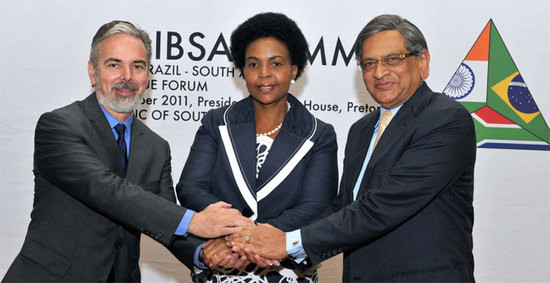This year, the IBSA grouping celebrated its tenth anniversary. Yet the way leaders in the Global South marked the special occasion was rather underwhelming: They canceled the summit that was supposed to take place in June 2013 in New Delhi. To make matters worse, the schedule in 2014 looks particularly crowded, with a BRICS Summit and a Football World Cup in Brazil, and general elections in all three member countries.
Yet it would be too early to argue that the IBSA grouping has lost its significance, as I have argued before. Strengthening South-South ties continues to be a strategic aim of the three, despite dramatically lower growth rates since 2012. As a consequence, the IBSA grouping continues to generate considerable interest in the global policy community. Yet – perhaps due to its informal character – the outfit often remains little understood. Why do member governments devote efforts and administrative resources to increase relations with distant partners? After all, despite sharing mutual political interests on the global stage, India, Brazil and South Africa were non-traditional economic partners in 2003 and for this reason their decision to collaborate in the IBSA forum may strike observers as somewhat unexpected.
What, then, has IBSA really achieved after ten years? A new working paper on the matter by Folashade Soule-kohndou, a researcher at Oxford University, is therefore a welcome contribution. Her overview of economic intra-IBSA ties nicely shows just how disconnected the three countries used to be – and how visionary the creation of IBSA really was. She correctly points out that trade flows since the creation of IBSA in 2003 significantly increased between the three countries: intra-IBSA trade grew from $2.5bn in 2003 to $21bn in 2012. The targets set during the summits and ministerial meetings to reach $10bn by 2004, and $15bn by 2010 were all reached. Yet she also cautions that despite significant growth, intra-IBSA trade is still tiny: Brazil’s trade with South Africa and India, for example, represented only 3% of its total trade. There is thus little evidence so far that IBSA made a decisive contribution towards trade diversification for the three countries.
The author argues that beyond the publicly stated aim of promoting south-south cooperation, the IBSA forum allows its members to pursue three underlying strategic aims: autonomization through the increase of strategic partnerships with emerging non-traditional partners (partly successful); socialization through the creation of transgovernmental and transnational networks (e.g. working groups); and greater visibility on the international stage, which increases political leverage.
Soule-kohndou’s section on socialization is particularly interesting. Her overall assessment is that “the various meetings of the 16 working groups and 7 non- government fora and their outcomes, although variable from one WG to another, provide strong evidence that the IBSA forum has gone beyond simple gatherings as expressed by some analysts.”
She provides interesting details that are often forgotten when journalists and policy makers assess the usefulness of IBSA. For example, she describes how
a trilateral meeting hosted by the World Bank and Cities Alliances in October 2011 brought together local and provincial level practitioners from the IBSA countries to discuss and share lessons on national programs to scale up slums upgrading, implementation of slum upgrading policies, planning and design instruments for city-wide slum upgrading, land tenure security and financing instruments for slum upgrading interventions at scale.
The working paper asserts that the international media has given ample visibility to IBSA summits, arguing that the outfit has indeed increased each IBSA countries’ leverage – even though such an assertion is of course very difficult to measure.
Finally, the author rightly points to the growing risk of overlapping activities between the BRICS and IBSA fora, and a Chinese interest in eventually merging the two. That would be a shame, as I have pointed out previously, given that India, Brazil and South Africa can, as democracies, discuss a far broader range of common challenges, including human rights.
Read also:
IBSA: Where do we go from here?
Why IBSA and BRICS should not merge
Photo credit: Jacoline Prinsloo/AFP









